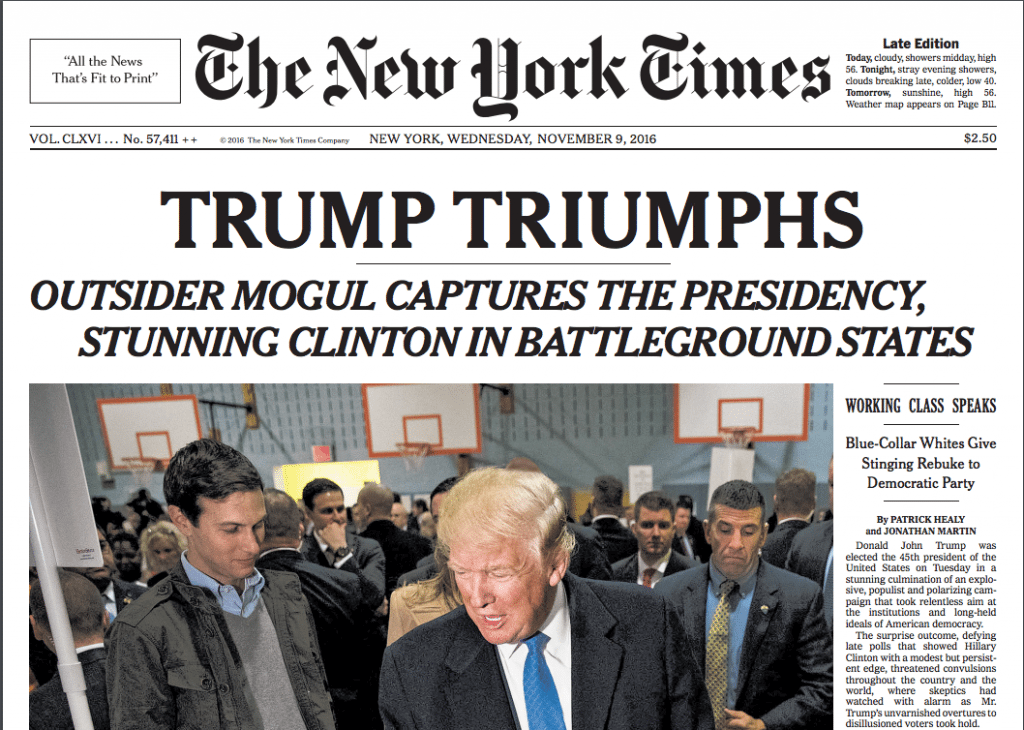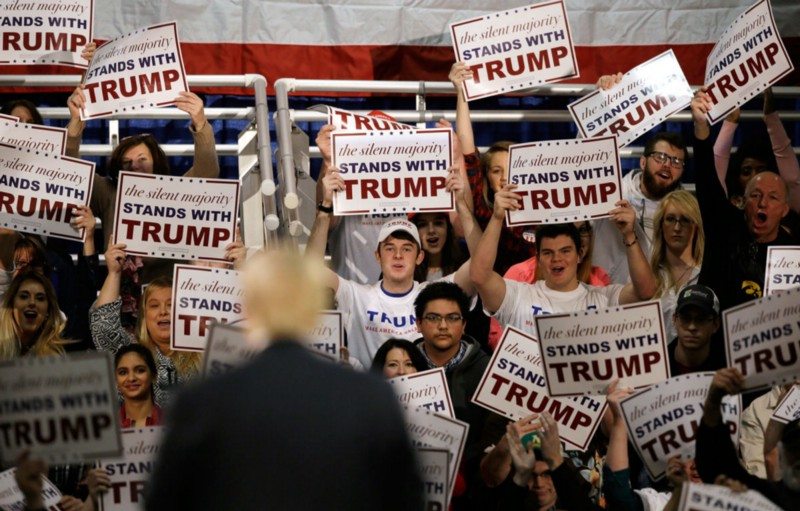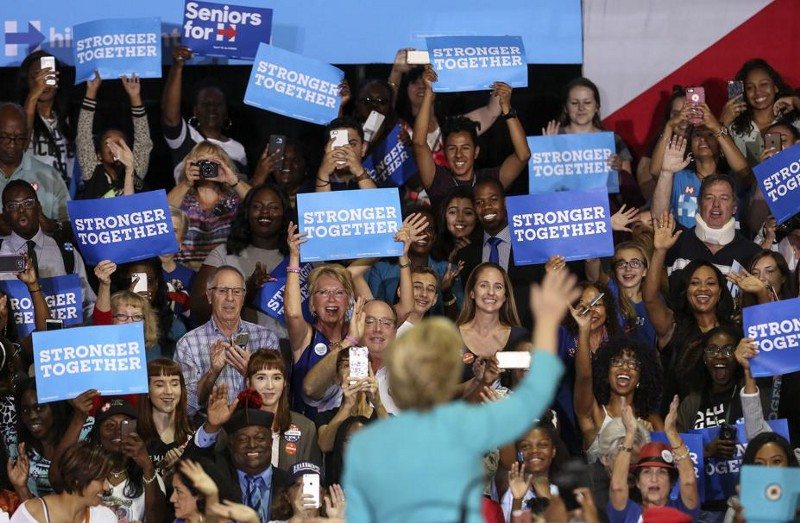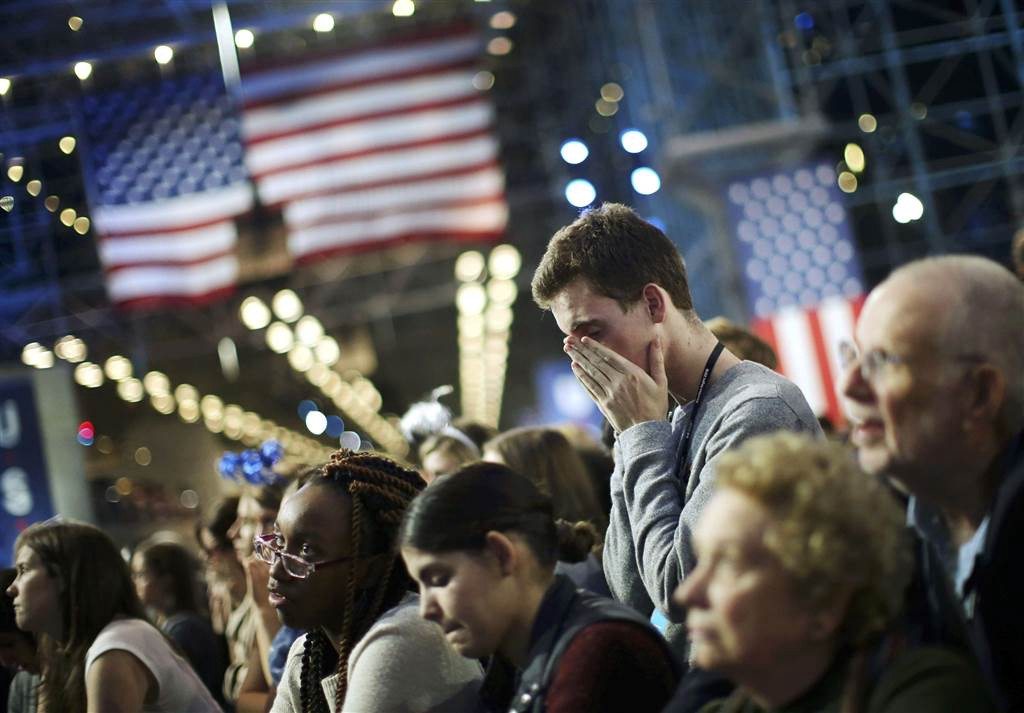CONTENTS
I. I remember this time last year
II. I remember last night
III. I remember this morning
IV. But most of all, I remember this.
***
I. I remember this time last year.
I remember this time last year.
I remember, for instance, coming home from work late one November night last year and talking to a friend:
‘He’s joking, right? He can’t possibly have a shot at winning the primary, let alone the Presidency.’
And I remember, too, the time I watched a man and his hate pour through a TV screen, watched him deride an entire nation as being rapists, murderers, and criminals.
I remember the time he insulted and publicly mocked the grief of a dead American soldier’s bereaved parents for their religion with an absence of empathy so stunning it broke my heart.
I remember, too, the time he pointed at a black man at one of his rallies and shouted at the crowed: ‘Look at my African-American over here.’
And I remember — with a queasy jolt to the stomach, with a sickening awareness, as only a woman can be aware, of feeling horrified, outraged, and vulnerable — as I watched him boast gleefully about grabbing women by the body parts of his choice. I played that tape over and over. I listened to his words over and over. I saw the arrogance and the stark, utter feeling of superiority, of impunity he felt as he uttered those words. Over and over. ‘When you’re a star, they let you do anything. Grab them by the pussy.’
* * *
II. And I remember last night.
I remember walking into the Abbey on Election Day with my heart racing slightly. The first few Southern states had already toppled, but they were the ones we had all been expecting to fall, anyway. I walked into a loud, crowded, hopeful room. I laughed and shared jokes and high-fives with strangers — young people, people who were warm and welcoming and loving and above all, hopeful. The night was still young.
I watched as the night then turned into hours of heart-stopping moments of anxiety and horror as the map on the screen moved right to left, bleeding red all over. We stepped out to get food, the farthest reaches of our mind clawing at the edges of a distant inevitability but not fully realizing it yet. As we walked the streets of West Hollywood, I saw fear in the streets. I saw people who looked afraid, people who were crying, and people whose faces were just simply blank, registering nothing but shock.
I watched as a complete stranger — who had overheard me and my friend talking in disbelief over what was happening — walked up to us and said:
‘It’s going to get so ugly. For all of us. For me as a gay man, for you two as women.’ And then he turned to me and added, almost as an afterthought, ‘For you, especially, because you’re a woman of color.’
For the first time out of many times that night and over the course of today, I felt my stomach drop. This was the first blow. The possibility, if not the reality, was just starting to sink in. At that very moment, I felt terror as I fully realized, for the first time, what this meant for me. What it feels like to be reduced to an entity to be pigeonholed into. As a woman — as a non-Christian, non-American, foreign, woman of color — I ticked off exactly all the boxes so hated and reviled by the man who now stood on the threshold of ascendancy to the highest office in the world.
This wasn’t supposed to happen, I thought — we all thought — as we clung desperately to hope. Then came midnight, and then came the big red number that had been inching closer and closer to 270 all night, then there was a declaration of the words ‘Trump’ and ‘45th’ and ‘President’ that had been so inconceivable strung together in the same sentence before until now, then there was something about ‘Hillary’ and ‘phone call’ and ‘concession’— and that word, concede, was the one that hurt the most, and then, all too soon, it was all over.
* * *
III. And I remember today, the morning after.
When I woke up this morning after a brief spell of sleep that had been so elusive to come, it was like waking up from a bad hangover. My first thought was immediately the events of last night.
I hopped on to Facebook, and my feed was inundated with shock, outrage, disgust, shame, anxiety, fear. My friends in America and in India, in Europe and Australia were all bemoaning what had just happened. Many of them had still not processed it fully, and for most of us today was a way of coming to terms with it.
At work, it was much the same — people were in disbelief and fear. My roommates shared the same sentiment. On Twitter, the people I followed were voicing the same outrage and shock and upset that I felt. And that was when the reality of what had just happened — and more important, why and how it had happened — started to sink in.
* * *
IV. But most of all, I remember this: the bubble you and I have lived in for the last year.
Almost mockingly, my own words — things I had said over course of the last year — came back to me this afternoon.
And that, above all, was what I remembered. My own words:
‘He’s joking, right? He can’t possibly have a shot at winning the primary, let alone the Presidency.’
‘He doesn’t have a shot, not a chance in hell, but he’s so delusional it’s kind of funny.’
‘He’s a joke, no one can possibly be taking him seriously.’
‘I can’t believe he’s the Republican nominee. I just cannot.’
‘How can someone be so unprepared for a presidential debate? What the hell did we just watch?’
‘All this will have been worth it when we finally elect the first female President.’
‘The election is only a month away and then he’ll be forgotten and people will move on.’
All of this, and other versions of the same sentiment, words we had all uttered over and over for the larger part of the last year until suddenly, one day, we all woke up to this:

Front page of the New York Times on the day after Election Day
Just like that. And none of us ever saw it coming.
The polls had it all wrong. The pundits had it all wrong. The media had it all wrong.
We watched, stunned and horrified, as everything seemed to make less and less sense by the minute until only one coherent thought remained:
How did this happen?!
This is how it happened.
We laughed and ridiculed a man who is by all accounts, racist, misogynistic, homophobic, a climate-change denier, a tax-evader, a con-artist, a liar, a xenophobe, a hate-monger, a religious chauvinist, a sexual assault apologizer, and a man grossly, grossly incompetent for the job.
We criticized and vilified him, we laughed at and lampooned him. And so did our media, and so did our friends, families, co-workers, roommates, our Facebook news feed, and the people we followed on Twitter. So did Reddit, and the New York Times, and Vox, and Buzzfeed, and the Washington Post.
If you gaze long into the abyss, the abyss stares back into you: and we gazed and gazed deeper into this void until we were entrapped and cushioned into our own little bubble. First we laughed, then we scoffed, then we criticized and condemned. We repeatedly bashed, denounced, jeered, scorned, and ridiculed this man and his supporters amongst ourselves until our voices grew louder and louder, until they were so loud they were drowned in the deafening din of our own echo chamber.
We cocooned ourselves into our little patch of indignity, outrage, and disbelief. We thought — but how can anyone else think otherwise? Can’t they see what we see? We thought that there were a plenty of nutjobs, sure — but on the whole, we assumed, common sense would prevail. We were elitist in our sense of right vs wrong, and elitist in our cherished and precious — now, more precious than ever — liberal ideals.
In a sense, we weren’t wrong in our beliefs— those ideals we stood for, equality, fairness, inclusiveness and freedom — are important and right will always be. But we were were wrong to approach our way as the absolutely right way, the only way, the obvious way. Not just you and me, but our media, equally. This election outcome was so shocking was because none of us expected it. Not you, not me, not Nate Silver. Within a matter of less than three hours, I watched the New York Times presidential forecast flip from a 86% chance of Clinton victory to a 95% Trump victory.
And it comes as a shock not because something totally unexpected happened on Election Day, but because we hadn’t been paying attention all along. We were so sure that we were in the right. That our way of thinking would prevail. We were so sure in our breathtaking arrogance that we never thought to consider that the other side had been brewing in an outrage of their kind all along, too.
Where the liberals went wrong
Today, I watched as my friends — well-meaning, morally decent, good people at heart — expressed shock and anger and despair all over my Facebook feed. I also noticed something else: amidst understandable shock and upset, there was an increasing number of posts in the following vein:
- If you voted for Donald Trump, unfriend me now
- If you voted for Donald Trump, fuck you.
- I am ashamed at America.
- How does it feel to hate America and the world?
I share their fear and their outrage. But, I do not share the hostility. Because my own words, my own arrogance in my cherished ideals, and my subsequent shock at their repudiation after the election result — have made me look at Trump’s supporters in a different way.

Charlie Neibergall / AP
Hillary won the popular vote, but it was a very tight race. That means that almost half of American voters voted for Trump. They backed Trump. They supported the man, the party, and the policies. Why would they do that? Initially, we were quick to write off these supporters as sexist, racist, misogynistic, and the barrage of other negative adjective we have come to associate with Trump himself. Again, that was to our own expense: pause and ask yourself: Did we consider, for a moment, and with legitimate sincerity, what really were the underlying reasons people were backing Trump? Was it because they were all just racist rednecks? Or was it something else?
Was it the fact that there is a large group of people, vast swathes of people all across America who were promised prosperity and have not seen that promise become a reality? Rural Americans, who made up the largest part of Trump’s prize conquest, had a host of frustrations: unemployment, expensive healthcare, America’s humiliation at the world stage, terrorism, a feeling that their voices didn’t matter, and that they weren’t heard and represented in the popular media. And in an irony almost too big to comprehend, the majority — white men and women — came to feel that they were the ones being marginalized.
Donald Trump capitalized on this widespread frustration and disenchantment with the American Dream. He used a cocktail of fear and hate. Things are wrong, and here’s why. It’s because of Mexicans, Muslims, and Obama. If you elect me, I will fight them all and make your problems go away.
And a large part of Trump’s supporters didn’t vote him because of the fact he has said all the horrible racist and sexist things, but in spite of the fact that he has said horrible and racist things.
For all the toxicity and hate back-and-forth in this election, I don’t believe the vast majority of Trump voters only voted for him because they are raging, flagrant, gun-toting, sexist, homophobic, racist rednecks (although many of them are). Rather, they voted for him because at the end of the day, they, just like you and me and our fellow liberals, wanted a better life. They wanted jobs and stability and security for themselves and their families and they bought into Trump’s rhetoric that he would give it to them. That is, in a nutshell, all that voters care about when it comes right down to it. How will this benefit me and my family?
And by de-legitimizing the reasons of his supporters for backing a Trump presidency, we are doing a disservice to the almost half the nation. In this vicious election cycle, both sides have consistently refused to reach out and empathize and start a dialogue to actually, genuinely communicate and understand each other’s shared frustrations, fears, and points of view.

Bruce R. Bennett/The Palm Beach Post
We are in shock because we thought Hillary Clinton’s presidency was in the bag. We were so sure —and here’s the uncomfortable truth: part of the reason we were sure was because we never saw the opposing camp’s concerns as valid. We cared about the country, we cared about protecting America’s ideals, all they cared about was being racist, homophobic, sexist, ad nauseum — how could they be so evil, how could they be so stupid?!
And that was our refrain, over and over, amongst ourselves and our friends, families, co-workers, our mainstream media, our social media. And in a cruel, cruel irony — we ended up doing the very thing we hated in the other side. Within our own echo chambers and our refusal to confront voter motivations, we ended up buying into the same poisonous Us vs Them rhetoric we so harshly criticize in and accused the Republicans of pushing.
In electing Donald Trump, nearly half of American voters have mandated their trust in the person they believe will help them alleviate, at long last, the worries and the hardships they have faced in these troubling economic and socio-political times. They look to him as the someone that will reignite the embers from the ashes of a dying American Dream.
It is entirely possible that American people have a made a deal with the Devil. The road to hell, as they say, is paved with good intentions. American people who voted for Trump may have voted with the best of intentions — what they believed was a better economy, better jobs, better healthcare, better futures for their families. The actual repercussions of a Trump presidency are much more complex. Because there is so much at stake — from climate change to reproductive rights and everything in between — this is easily the costliest Presidency in recent decades.
But if there’s anything I’ve learned from this election, it’s our own echo chambers and an Us vs Them narrative— whether it’s from our side or the other’s — that are the costliest thing of all.
* * *
What happens next
For now, American people must take heart. Moving to Canada is not the answer. Assassinating Donald Trump, as many are only half-jokingly suggesting on social media, is not the answer. Democracy works by a system of checks and balances. American people have a great responsibility, now more than ever, to keep that democracy in check. Not only because America’s future is at stake — but because of the role America plays in the world, the world’s future is at stake, too.
The good thing about this election was that it lay out in the open the extent of the deep divide that has so ruptured the nation. All sides, Democrats, Republicans, independents, liberals and conservatives — need to truly understand one another. We as liberals cannot smugly proclaim we are better than the other side. We cannot live in our own little bubbles and assume everyone will think the way we do. And our media cannot isolate one side and pitt the two opposing sides against each other.
This is a costly but timely lesson for Democrats and the liberal establishment as a whole. The Democrats took their base for granted. They failed to put their finger on the pulse of the nation, to sense the undercurrents of seething resentment, rage and fury that had been brewing in America’s underbelly as the ‘silent majority’ all along. And that silent majority showed up to vote. Democratic voters, on the other hand, showed up in lower numbers, by 5 million lower voters than in 2012. For far too long now the Democratic Party has preached to the choir. This should make Democratic Party take a long hard look at themselves. It is a task for the Democrats now to reach out to all Americans, not just the dormant Dems who stayed indoors on Election Day — but also the Republicans and Independents who showed up to vote.
And it is up to us as individuals as well.
Reach out to your Republican friends. And if you have none — make some. Talk to them, but more importantly, listen. Help us understand one another. We have to actively engage, peacefully protest, communicate, empathize, and understand. And we have to help the other side do that, too.
Psst! Our free newsletter offers the greatest and the smartest ideas, essays, books and links in one convenient place. The emails you receive will be short, smart, and always interesting. Sign up here >>

